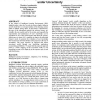Free Online Productivity Tools
i2Speak
i2Symbol
i2OCR
iTex2Img
iWeb2Print
iWeb2Shot
i2Type
iPdf2Split
iPdf2Merge
i2Bopomofo
i2Arabic
i2Style
i2Image
i2PDF
iLatex2Rtf
Sci2ools
ICALT
2003
IEEE
2003
IEEE
Adaptive Exploration of Assessment Results under Uncertainty
In the context of Intelligent Learning Environments (ILE), adaptivity plays a key role. In order to achieve adaptive behavior an ILE should have a rich representation of the learning context, which is defined, among others, by the learner’s characteristics, the type of the educational material, the advisory history, etc. Actually, the user model used by the system, and especially the representation and maintenance of user’s knowledge can be considered as one of the critical factors that affect the system’s effectiveness, in terms of it’s capability to adapt to the individual learner’s needs. In general, the evaluation of user knowledge derives from tests and tasks that the system proposes to the user to accomplish. This paper describes an approach that refines assessment results through user knowledge exploration, incorporating probabilities. We argue that the proposed approach leads to a better mapping of the assessment results to user knowledge in terms of its adaptivity t...
ICALT 2003 | Individual Learner | Intelligent Learning Environments | Machine Learning | User Knowledge |
| Added | 04 Jul 2010 |
| Updated | 04 Jul 2010 |
| Type | Conference |
| Year | 2003 |
| Where | ICALT |
| Authors | Dimitris Lamboudis, Anastasios A. Economides, Anastasia Papastergiou |
Comments (0)

